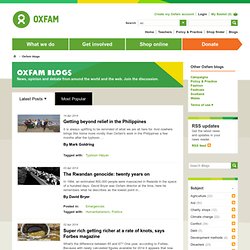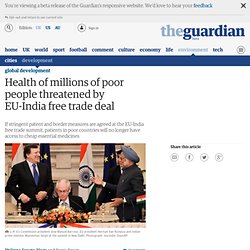

THE DOHA DECLARATION ON THE TRIPS AGREEMENT AND PUBLIC HEALTH. Oxfam: Secret plans to criminalize generic medicines could hurt poor people » Oxfam News Blog. It is always uplifting to be reminded of what we are all here for.

And nowhere brings this home more vividly than Oxfam's work in the Philippines a few months after the typhoon. ... In 1994, an estimated 800,000 people were massacred in Rwanda in the space of a hundred days. David Bryer was Oxfam director at the time, here he remembers what he describes as the lowest point in... What's the difference between 85 and 67? One year, according to Forbes. Bp143-eye-on-the-ball-medicine-regulation-020211-en. Health of millions of poor people threatened by EU-India free trade deal. Current negotiations on a free trade agreement (FTA) between the European Union and India are causing serious concern in many quarters over future access to cheap generic medicines used to treat some of the world's great public health threats: HIV, tuberculosis and malaria, and also cancer.

Those fears are well founded: if the EU and India agree on stringent patent and border measures, India's role as the "pharmacy of the south" could well come to an end. The result could see patients in poor countries facing stock-outs, price increases and even having to pay the full cost of their treatment – meaning that only the richest among them will get treated. And we have to remember that a young African diagnosed with HIV today will have to stay on treatment for the next 50 years, not only to keep alive but to avoid transmitting the virus. The medicines-related issues discussed in the FTA are not only a question of public health, but of ethics, justice and reason.